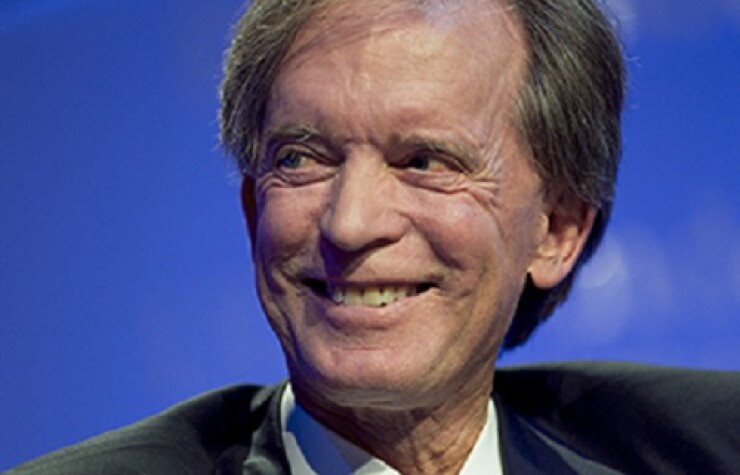
After $110 billion of outfllows, Pimco's Total Return finally lost its position as the world's biggest bond mutual fund - the result of underperformance, being caught between management turmoil and the ongoing trend of cost-sensitive investors shifting from actively managed to index funds, industry observers say.
With assets of $110.4 billion, Pimco's Total Return Fund fell behind the Vanguard Total Bond Market Index Fund, which had $117.3 billion as of April 30, Bloomberg reports.
Pimco's fund reached a peak of $293 billion in April 2013, but tumbled after longtime manager Bill Gross left the Newport Beach, Calif. firm he helped found for Janus Capital Group. Many investors cited the very drawn-out and public management disputes at the firm for their decision to pull investments.
But even if Pimco was not subjected to such dissent, its flagship fund was still going to be succeeded by Vanguard, says Gregory Sullivan, president of Sullivan, Bruyette, Speros & Blayney in Maclean, Va.
"You're seeing two big events going on," Sullivan says. "When an icon and a major leader of a firm leaves, assets are going to flood out as it gives investors a chance to stop and reflect why they are owning that fund.
"But the other major event is that people are taking a harder look at expenses, especially in the lower bond return environment, and asking if they can return value. So that's why money is moving into Vanguard. They are a purveyor of index funds at lower expenses that are attractive to institutional advisors and retail investors.
"Vanguard's got an edge right now against a lot of the bond companies in particular."
Vanguard's Total Bond Market Index Fund, for instance, has an expense ratio of 0.07% compared to Pimco's Total Return expense ratio of 0.46%
Vanguard's quiet ascension, adds Jeff Tjornehoj, head of Americas research for mutual-fund-research firm Lipper, is not all due to Pimco's management woes.
"The story of Pimco we know well," Tjornehoj says. "What we know less about is how steadily Vanguard found new clients for its index bond products. They've gravitated to Vanguard, which has been very successful with new investors and picking up the pieces from other managers."
CORE HOLDING
Tjornehoj says one particular advantage that Vanguard possesses is that it also runs an ETF version of the Total Bond Market strategy, which holds $27 billion in assets. Bloomberg notes that the firm's ETFs are run as mutual fund share classes, a Vanguard patented structure. "Nobody else can put together an ETF share class," he says. "It makes the portfolio look bigger."
The Vanguard bond fund's ascent, he adds, was not a vindication of Jack Bogle's index investing approach.
"Bogle accomplished a couple of things," Tjornehoj says. "One is that owning an index fund that slightly underperforms a benchmark won't be disastrous. You won't have acrimonious relationships in the news."
Vanguard's fund "has definitely benefited from a diverse base of long-term shareholders," Katie Henderson, a spokeswoman for Valley Forge, Pa.-based Vanguard Group, told Bloomberg. "We have advisers, institutions, and individuals who use this really as a core long-term holding."
Pimco did not have a comment on the development, a company spokesman said. On its website, the only comment the firm notes about the fund is that it delivered a net after fee return of 1.62%, "outperforming its benchmark by 38 basis points and generating excess returns of 30 basis points above the Morningstar Intermediate Term Bond Average."
Todd Rosenbluth, senior director at S&P Capital IQ and is Director of ETF and Mutual Fund Research in the U.S., also deemed Pimco's fall and Vanguard's rise as a tale of active versus passive, management and marketing.
"[This] is as much about the success of Vanguard as it is about the weakness that Pimco has seen," Rosenbluth says. "Vanguard was gaining market share even if we didn't have departure of Gross. That just exacerbated the outflows."
CONTINUED OUTFLOWS
Rosenbluth predicted Pimco's Total Return will continue to experience outflows, despite the fund's new management team of Mark Kiesel, Scott Mather and Mihir Worah, advancing it 1.4% this year through May 1, and outperforming 78% of similarly managed funds, according to Bloomberg.
Vanguard Total Bond Market Index, a passive fund tracking a broad fixed-income benchmark, returned 0.9% in the same period, beating 31% of its peers, Bloomberg also reports.
"They've been doing the right things," Rosenbluth says. "But it has essentially been just seven months. Institutional investors like stability, they like to look at a long-term track record of success. Right now, Pimco doesn't have that, whereas there's alternatives in the active space that do and in passive, namely Vanguard."
Rosenbluth expects that as it has progressively found its way to the top, Vanguard's index fund will retain that leading position until market conditions change.
"Because it is a passive low-cost fund and it is not going to deviate from the index, investors are going to get an average return for the foreseeable future," he says. "I think the fund will experience challenges when the category experiences challenges. This will happen at some point, investors will rotate out of bond funds when interest rates change.
But there isn't going to be a management change that pauses its growth. I expect the fund will continue to gather assets at a faster pace than many alternatives."
Sullivan says that Pimco still has good performance, and "most companies would die to have the size of portfolio they have ... they are a great company with great people. They are not going anywhere, but it is hard for them to stay at the top right now."
He wonders how the bond market will shape up with rising interest rates, and whether Pimco will be the only one to suffer outflows. "Bonds are going to get more challenging over the next couple of years," Sullivan says. "It's going to be challenging for everybody."





